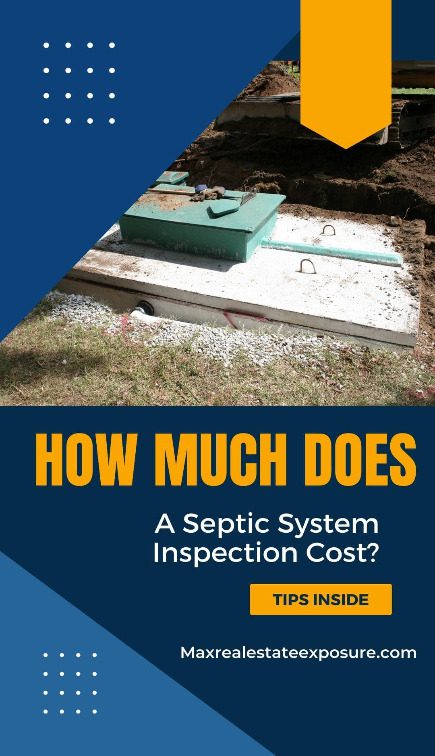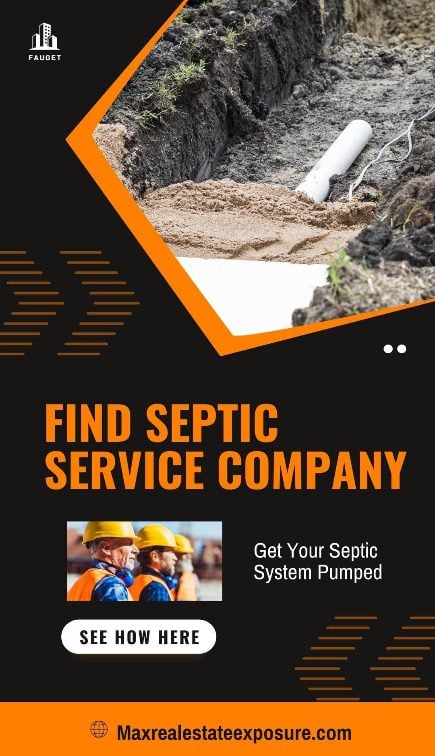What to Know About Septic Systems Inspection Costs
 Are you wondering how much a septic inspection costs?
Are you wondering how much a septic inspection costs?
Septic inspections play a crucial role in ensuring the functionality and integrity of septic systems. These inspections vary in type, whether routine, for buying or selling a house, maintenance-related or to address system issues.
The cost of a septic inspection depends on factors like tank size, the type of inspection required, and any additional services or repairs deemed necessary.
Depending on the purpose and depth of the inspection, you can expect to pay a few hundred dollars up to $1000 or more when selling a house. For example, Title V requires sellers to pass a septic system inspection in Massachusetts.
In my experience as a real estate agent for the past thirty-seven years, the cost of septic inspections has been around $800-900 for most homes. The pricing has been higher when the septic service company has had to do more research on locating the system.
When sellers have a land survey in hand, the price is usually less due to the ease of finding the system.
Understanding the average cost range is essential for homeowners. Regular inspections help maintain a well-functioning septic system, preventing costly repairs and replacements.
Finding a qualified inspector is critical for accurate inspection reports. Proper maintenance and the involvement of real estate agents further contribute to a smooth inspection process.
Types of Septic Inspections
When it comes to septic inspections, various types serve different purposes. Understanding these types will help you determine the specific examination you need for your septic system.
The main types of septic inspections are the following:
Routine septic inspection
A routine septic inspection involves a thorough assessment of the overall condition of your septic system. It includes inspecting the tank, drain field, pipes, and other components to ensure they function correctly. This type of inspection is typically recommended every 1-3 years to identify potential issues before they escalate into costly problems.
Inspection for buying or selling a house
When buying or selling a house with a septic system, it is crucial to have a specialized inspection. This inspection aims to assess the condition of the septic system and determine if any repairs or replacements are needed before the transaction.
It provides the buyer and seller peace of mind by ensuring the septic system is in good working order.
Inspection for maintenance purposes
A maintenance inspection focuses on evaluating the current state of your septic system to ensure its continued functionality. It involves inspecting the tank, checking for any signs of wear or damage, and assessing the sludge and scum accumulation level.
It would be wise to add this to your spring home maintenance checklist.
This type of inspection helps identify maintenance needs and allows for timely action to prevent potential issues. During this type of inspection, septic tank pumping is typically performed.
The cost of septic tank cleaning is minimal in the grand scheme of proper maintenance.
Inspection for system failure or issues
Conducting a specialized inspection for system failure or issues is essential if you suspect a problem with your septic system, such as backups, sewage odors, or unusual noises. This inspection aims to identify the cause of the problem and determine the necessary repairs or replacements to restore the septic system’s functionality.
By understanding the different types of septic inspections available, you can choose the most suitable one for your needs.
Routine inspections, as well as inspections for buying or selling a house, maintenance purposes, and system failure or issues, play a crucial role in ensuring the proper functioning of your septic system.
The septic system inspection cost is well worth it compared to what you’ll pay for system replacement.
Understanding the Cost Factors for Septic Inspections
 When it comes to septic inspections, understanding the cost factors involved can help you make informed decisions. Several factors influence the cost of a septic inspection:
When it comes to septic inspections, understanding the cost factors involved can help you make informed decisions. Several factors influence the cost of a septic inspection:
Size of the septic tank
The size of your tank plays a significant role in determining the septic inspection cost. Larger septic tanks require more inspection time and effort, affecting the overall cost. Smaller tanks, on the other hand, might be less expensive to inspect.
Type of inspection required
Different types of septic inspections have varying costs. Routine inspections that involve a basic assessment of the system’s condition typically fall within the lower end of the cost range. However, inspections conducted for buying or selling a house may include a more comprehensive evaluation, potentially increasing the overall cost.
Additional services and repairs
Additional services like pumping or cleaning may be required during a septic inspection. These services, if needed, can add to the overall cost of the inspection. Likewise, if any repairs or replacements are necessary, they will incur additional expenses beyond the base inspection cost.
Considering these cost factors, you can better understand the pricing structure associated with septic inspections.
Discussing these factors with your inspector beforehand is essential to ensure transparency and avoid surprises regarding the final cost.
Average Cost of a Septic Inspection
When considering the cost of a septic inspection, it’s essential to understand the factors influencing the price range. These factors include the size of the septic tank, the type of inspection needed, and any additional services or repairs required.
Factors influencing the cost range
- The septic tank size: Larger tanks may require more time and effort to inspect, resulting in a higher cost. Larger septic tanks are typically designed for larger homes with more bedrooms.
- The type of inspection required: Different inspections, such as routine maintenance or inspections for buying or selling a house, may have varying costs.
- Additional services and repairs: If any other services, such as pumping or cleaning, are needed during the inspection, it can increase the overall cost.
Cost breakdown for different types of inspections
The cost of a septic inspection can vary based on the specific type of inspection required. Here is a breakdown of the average prices for different types of inspections:
- Routine septic inspection: On average, a routine septic inspection can range from $100 to $250.
- Inspection for buying or selling a house: The cost can range from $250 to $1000 when inspecting part of a real estate transaction. Some inspectors may charge an additional fee for uncovering the septic tank lid.
- Inspection for maintenance purposes: Regular maintenance inspections, recommended every 1-3 years, typically cost between $100 and $250.
- Inspection for system failure or issues: If there are signs of system failure or other problems affecting its functionality, a specialized inspection may be required. The cost for such checks can vary widely, ranging from $100 to $1,000, depending on the extent of the issues found.
It’s important to note that these costs are averages, and pricing may differ based on your location and specific circumstances. Consulting with a licensed septic inspector will give you a more accurate estimate for your situation.
Importance of Regular Septic Inspections
Regular septic inspections are crucial for maintaining the functionality of your septic system and preventing costly repairs and replacements down the line.
Maintaining the functionality of the septic system
You can ensure your septic system works efficiently by scheduling regular septic inspections. Reviews help identify any issues with the tank, drain field, or other system components that may hinder its proper functioning.
Detecting problems early on allows for timely repairs, keeping your septic system operating smoothly.
During an inspection, the septic professional will assess the system’s overall condition, check for any signs of blockages or leaks, and evaluate the wastewater treatment process. This helps ensure the tank processes and stores wastewater properly, preventing any potential backups or environmental contamination.
Regular inspections also give you peace of mind, knowing your septic system is functioning as intended.
Preventing costly repairs and replacements
Regular septic inspections are an investment in the long-term health of your septic system and can save you significant costs associated with major repairs or even complete system replacements.
Identifying and addressing minor issues early on can prevent them from escalating into more significant and expensive problems.
Septic systems that are improperly maintained and inspected can develop severe issues over time. Poor maintenance can lead to clogged drains, sewage backups, flooding in the yard, or even septic system failure. These problems often require costly repairs or, in severe cases, complete septic system replacement, which can be a significant financial burden.
Regular inspections allow you to catch potential problems before they become more extensive and expensive. By addressing issues promptly, you can avoid disruptions to your daily routines, minimize repair costs, and extend the lifespan of your septic system.
One wise tip is to avoid installing garbage disposals as they kill the lifespan of a septic system.
Overall, prioritizing regular septic inspections ensures the proper functioning of your system and helps you avoid costly repairs and replacements in the future.
Finding the Best Inspector for Your Septic Inspection
 How to Find Septic Service Near Me
How to Find Septic Service Near Me
You can ask your real estate agent for a referral if you don’t know any septic service companies. Friends or family who have recently sold a home might also be helpful.
Doing a Google search will also be beneficial. You can look up septic service near me or septic inspections near me. Both should provide useful results.
Qualifications and Certifications to Look For
When searching for a reliable inspector for your septic inspection, it’s crucial to consider their qualifications and certifications. Look for inspectors who possess the necessary expertise and knowledge in septic systems.
Some essential qualifications to look for include:
- Proper licensing and certification in septic system inspections
- Membership in professional organizations related to septic systems
- Training and experience in conducting thorough septic inspections
Tips for Choosing a Reputable Inspector
Choosing a reputable inspector ensures a comprehensive and unbiased septic system assessment.
Consider the following tips when selecting an inspector:
- Ask for recommendations from trusted sources, such as friends, family, or real estate professionals
- Check online reviews and ratings for inspectors in your area
- Inquire about their experience in inspecting septic systems similar to yours
- Request sample inspection reports to evaluate the level of detail provided
- Compare pricing among different inspectors while considering their qualifications and customer satisfaction
By following these guidelines and finding a qualified and reputable inspector, you can ensure a thorough and reliable septic inspection for your property.
Understanding Your Inspection Report
To make informed decisions about your septic system, it is crucial to understand the information provided in your inspection report. The report serves as a comprehensive evaluation of the condition and functionality of your septic system.
Here are the key aspects to expect in a typical inspection report:
What to expect in a regular inspection report
- A detailed description of the septic tank, including its size, material, and age.
- Assessment of the condition of the tank and distribution box, checking for signs of deterioration, leaks, or structural issues.
- Evaluation of the leach field, inspecting the absorption area, and assessing its performance.
- Analysis of the effluent quality and potential contamination risks.
- Testing components and systems, such as pumps, alarms, and distribution boxes.
- Identification of any visible blockages, backups, or other plumbing issues.
Interpreting and addressing any identified issues
If the inspection report identifies any issues or areas of concern, it is essential to address them promptly to prevent further damage or system failure. Here are some steps to take:
Understanding the severity of the issues
Some issues require immediate attention and repair, while others require regular monitoring or maintenance. It is essential to understand the severity of each identified problem to determine the appropriate course of action.
Seeking professional advice
If you are unsure about how to address specific issues mentioned in the report, it is recommended to consult a licensed septic system professional. They can provide expert guidance and recommendations based on the particular needs of your system.
Scheduling repairs or maintenance
Once you understand the identified issues, you can schedule necessary repairs or maintenance. Acting promptly can help prevent further complications and costly repairs in the future.
Regular monitoring and follow-up inspections
After addressing any identified issues, monitoring your septic system regularly is crucial to ensure its ongoing functionality and prevent future problems. Consider scheduling follow-up inspections or routine maintenance as recommended by your inspector.
By understanding and taking appropriate action based on the information provided in your inspection report, you can maintain the health and longevity of your septic system, saving both time and money in the long run.
Regular maintenance is essential when you have a septic system.Click To TweetCost-Saving Tips for Septic System Maintenance
Proper care and regular septic system maintenance are crucial for longevity and functionality. By following these cost-saving tips, you can avoid expensive repairs and ensure optimal performance:
Proper care and maintenance recommendations:
- Be mindful of what you flush: Avoid flushing non-biodegradable items, such as wipes, sanitary products, and certain chemicals, which can disrupt the natural decomposition process in your septic tank.
- Conserve water usage: Excessive water usage strains your septic system. Install water-efficient fixtures, repair leaks promptly, and spread laundry and dishwashing loads throughout the week.
- Use septic-safe cleaning products: Harsh chemicals can harm the delicate balance of bacteria in your septic tank. Choose environmentally friendly and septic-safe cleaning products to maintain a healthy system.
- Keep the drain field clear: Avoid parking vehicles or placing heavy objects on your leach field, as it can damage the pipes and hinder proper wastewater absorption.
- Know the location of your septic system: Familiarize yourself with the area of your septic tank and drain field. This knowledge will help prevent accidental damage during landscaping or construction projects. Hire a property surveyor if you don’t know where it’s located. The cost of a land survey for septic is worth the expense.
Using septic treatment products regularly
Using septic treatment products can promote the growth of beneficial bacteria in your septic system, aiding in the breakdown of waste. Consider the following:
- Choose proven septic treatment products: Look for products specifically designed for septic systems and have positive reviews from reliable sources.
- Follow the recommended dosage instructions: Use septic treatment products as instructed, neither overusing nor underusing them. Following the recommended dosage helps maintain a healthy balance of bacteria in your septic tank.
- Consider natural alternatives: There are environmentally friendly septic treatment options available that utilize natural enzymes or bacteria to enhance the efficiency of your system.
- Consult with professionals: If you have any doubts or questions regarding septic treatment products, consult with septic system professionals or experts for guidance.
The Role of Real Estate Agents in Septic Inspections
Real estate agents are vital in facilitating septic inspections for buyers and sellers. They act as a bridge between the parties involved and help ensure a smooth transaction process.
There are two main aspects of their involvement in septic inspections: communicating the importance of inspections to buyers/sellers and collaborating with inspectors to address the inspection results.
Communicating the Importance of Inspections to Buyers/Sellers
When it comes to septic systems, many buyers and sellers may not fully understand their significance or their potential risks. Here’s how real estate agents can effectively communicate the importance of septic inspections:
- Educate clients: Agents need to provide buyers and sellers with accurate information about septic systems, their maintenance, and potential issues that can arise. Well inspections also become essential when you have a septic system.
- Highlight potential costs: By explaining the potential costs associated with septic repairs or replacements due to negligence, agents can emphasize the importance of thorough inspections.
- Emphasize compliance: Agents should inform clients about local regulations and legal requirements for septic inspections, ensuring they know their responsibilities.
Collaborating with Inspectors and Addressing Inspection Results
Real estate agents also play a crucial role in coordinating with septic inspectors and addressing the inspection results. Here are some key aspects:
- Finding reputable inspectors: Agents should have a list of qualified septic inspectors to recommend to their clients, ensuring they work with professionals who can provide accurate and unbiased reports.
- Coordinating inspection appointments: Agents must collaborate with buyers and sellers to schedule convenient appointments for everyone involved.
- Reviewing inspection reports: Agents should thoroughly review the reports with their clients, highlighting any identified issues and discussing potential solutions.
- Facilitating negotiations: If inspection results reveal significant septic system issues, agents can assist in renegotiating the terms of the sale or facilitating repairs between the parties.
Final Thoughts on The Cost of Septic Inspections
Real estate agents have a significant role in septic inspections, from effectively communicating the importance of inspections to coordinating with inspectors and addressing inspection results. Their knowledge and expertise ensure a smooth process for buyers and sellers, helping them make informed decisions and navigate any septic-related issues that may arise during a transaction.
The septic inspection cost is mild compared to a lack of maintenance and eventual system replacement.
About the Author: The above Real Estate information on the cost of a septic inspection was provided by Bill Gassett, a Nationally recognized leader in his field. Bill can be reached via email at billgassett@remaxexec.com or by phone at 508-625-0191. Bill has helped people move in and out of Metrowest towns for 37+ Years.
Are you thinking of selling your home? I am passionate about real estate and love sharing my marketing expertise!
I service Real Estate Sales in the following Metrowest MA towns: Ashland, Bellingham, Douglas, Framingham, Franklin, Grafton, Holliston, Hopkinton, Hopedale, Medway, Mendon, Milford, Millbury, Millville, Northborough, Northbridge, Shrewsbury, Southborough, Sutton, Wayland, Westborough, Whitinsville, Worcester, Upton, and Uxbridge MA.


 How to Find Septic Service Near Me
How to Find Septic Service Near Me